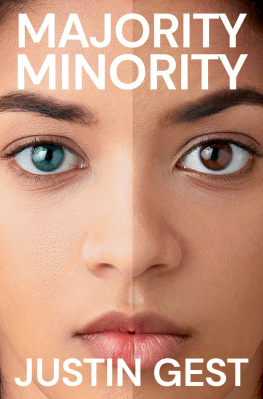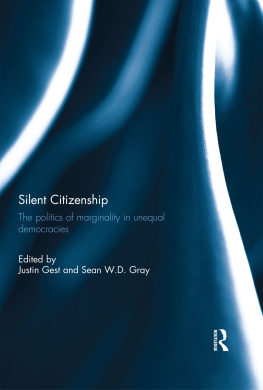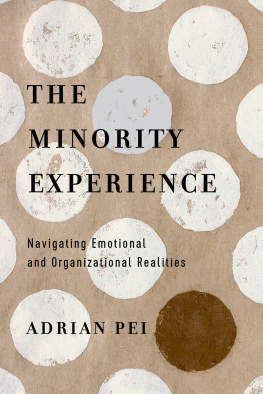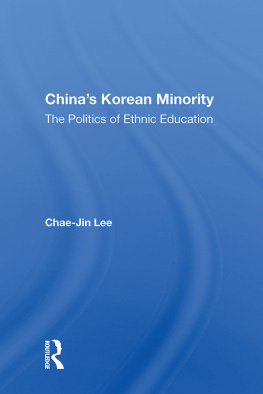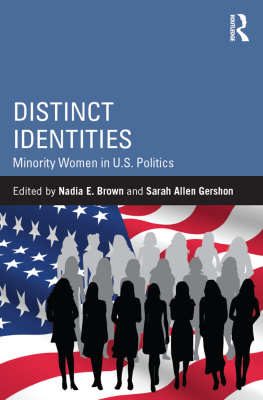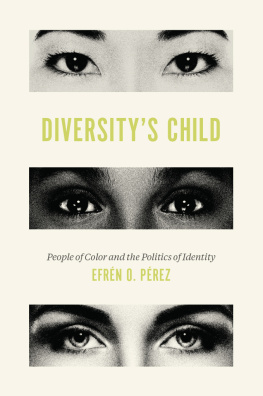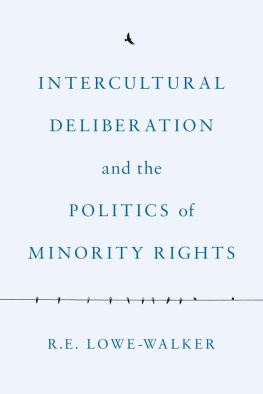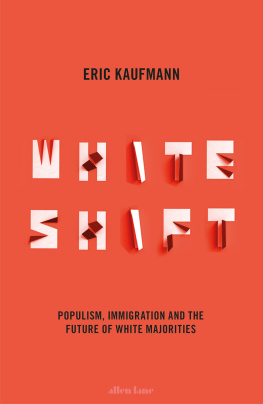Majority Minority

Oxford University Press is a department of the University of Oxford. It furthers the Universitys objective of excellence in research, scholarship, and education by publishing worldwide. Oxford is a registered trade mark of Oxford University Press in the UK and certain other countries.
Published in the United States of America by Oxford University Press
198 Madison Avenue, New York, NY 10016, United States of America.
Justin Gest 2022
All rights reserved. No part of this publication may be reproduced, stored in a retrieval system, or transmitted, in any form or by any means, without the prior permission in writing of Oxford University Press, or as expressly permitted by law, by license, or under terms agreed with the appropriate reproduction rights organization. Inquiries concerning reproduction outside the scope of the above should be sent to the Rights Department, Oxford University Press, at the address above.
You must not circulate this work in any other form and you must impose this same condition on any acquirer.
Library of Congress Control Number: 2021950971
ISBN 9780197641798
eISBN 9780197641811
DOI: 10.1093/oso/9780197641798.001.0001
The difference between peace and mayhem is velocity.
Teju Cole, Blind Spot
Contents
The seventeenth-century English poet John Donne, wrote, No man is an island entire of itself; every man is a piece of the continent, a part of the main.
In pursuing this study of many islandssome on the periphery of the earthin order to understand trends on the mainlands of todays politics, I was no exception to Donnes rule. Indeed, I was reliant on the support of so many dear colleagues and friends; they were each a bridge over the shifting sea.
Majority Minority was first conceived during my 2017 study leave at Henrietta Moores Institute for Global Prosperity at University College London. Henrietta has always nourished my creativity and ambition, and I am forever in debt for her guidance. While in London, I had a fateful meeting with my other beloved mentor, David Held, at St. Pancras Station. David passed away before I ever saw him again, but his advice that August day wasas everso intelligent and pivotal to my formulation of this book.
Upon my return to Washington, DC, I was in frequent correspondence with Jack Goldstone, who always found time to read drafts of this book and its contents. His advice was sage, constructive, and so clarifying. In January 2021, Jack also masterfully chaired a two-day book workshop, during which I received invaluable feedback from brilliant thinkers, including Richard Alba, Johanna Birnir, Eve Fairbanks, Nancy Foner, Morris Levy, Noora Lori, Roger Waldinger, Min Zhou, and Daniel Ziblatt. Thank you, all.
In between the books conception and completion, I learned an enormous amount from Mark Frost, Hidetaka Hirota, and Mariko Iijima, my collaborators in a special issue of the Journal of Ethnic and Migration Studies. Raymond Ramcharitar was another key contributor, indispensable to my fieldwork in Trinidad and Tobago and my general intellectual development these past few years. I am also grateful for the engagement of Amitava Choudhury, Jane Kinninmont, and Davianna Pmaikai McGregor, the last of whom was indispensable to my fieldwork in Hawaii. I could not have covered so much ground without you all. My thanks also to the journals editors, Paul Statham and James Hampshire.
In my fieldwork and case studies, I am profoundly grateful for the generosity of my many respondents. They trusted me, gave me their time, and opened their souls in a remarkably candid way. I am also indebted to various people whom I cannot thank publicly for the information and tips they provided off the record or on background. In the field, I was further aided by guidance from Hussain Al-Shabib, Betsy Cole, James Crabtree, and Justin Gengler, and research assistance from Justin Fraterman and Sally Kishi.
In my survey research, I appreciate the wisdom and friendship of my coauthors, Jeremy Ferwerda, Morris Levy, and Tyler Renywonderful partners and excellent scholars who have contributed so much to my understanding of political behavior and political psychology.
Different parts of the book benefited from a Social Science Research Council workshop led by Ira Katznelson, a special-issue partnership with Karen Alter and Michael Zrn, a journal workshop at George Mason University sponsored by Dean Mark Rozell, and personal feedback from Daphne Halikiopoulou and Steve Levitsky. I also want to thank Terri Givens, Eric Kaufmann, and the many anonymous colleagues who reviewed either the book manuscript or articles related to its contents over the last few years.
At Oxford University Press, I would like to thank my editors, Angela Chnapko, Dave McBride, and Niko Pfund for their balanced judgment, smart management, and faith in my work. Thanks also to Alexcee Bechthold, Richa Jobin, David Lampo, Mehmet Yildirim, and Alex Reeves for their work in preparing the book for publication.
Indirectly, this book benefited from my countless conversations with the unsung heroes of American civil society addressing the social challenges of demographic change and the political conflict it is generating. In particular, Wendy Feliz and Suzette Brooks Masters have been invaluable thought partners, and I also appreciate the impactful conversations I have had with luminaries like Samar Ali, Tom Davis, Josh Dickson, Mary Ellen Geiss, Jonathan Gruber, Zac Hill, Caroline Hopper, Katie Lauer, Maya MacGuineas, Andrew Mangino, Mike Murphy, Eboo Patel, Ashley Quarcoo, Stephen Noble Smith, Tim Shriver, Mike Van Haelewyn, and Eric Ward. If the United States is to surmount these challenges, it will be thanks in no small part to the tireless efforts of this motley group.
My fieldwork and survey experiments were made possible by research grants from the Alliance of Liberals and Democrats for Europe, Bloomberg Philanthropies New American Economy, the Charles Koch Foundation, and the International Republican Institute. Thank you for your interest in the politics of immigration and demographic change and your generous support of my research agenda.
Subtly, silently, but substantially, this book has the fingerprints of my outstanding research assistant, Tim OShea. There was no task too daunting, too extraordinary, or too arduous for Tim. He rose to every occasion and supported the preparation of my manuscript despite his own scholarly pursuits and other commitments. And he did it all with charisma and a great sense of humor.
Finally, for their personal support, I would like to thank my friends, and especially my familyMax and Gail, Darren and Rebecca; Phillip and Franklin; Gyrgy and Tanja; dm and George; Valentina and Hugo; and my dear Monika, who keeps everything in perspective for me and does so much to facilitate the work that brings me so much joy. As David Held wrote in one of his last messages to me, Life is a joy. The rest will fall into place.
Justin Gest
Arlington, Virginia
A Fortune Told
On March 3, 2015, the date for American social upheaval was set.
That day, the US Census Bureau published a report projecting that by 2044, the United States would become a majority-minority countrythat is, a country where immigration and fertility rates lead one or more ethnic or religious minorities to outnumber the original ethnic or religious majority. In the United States, it has been understood as a scenario where non-Hispanic white people comprise less than 50 percent of the population. The reports release spurred a string of news analysessome gleeful, others anxiousabout the end of the white majority just one generation away, a stunning forecast in a normally obscure government write-up.

